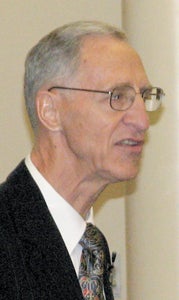Economist: Cut defense reliance
Published 11:07 pm Wednesday, November 7, 2012
An Old Dominion University economist on Wednesday warned against over-dependency on defense spending, lack of investment in regional infrastructure and overbuilding of hotels during a Suffolk Foundation event.
Dr. James V. Koch, professor of economics and president emeritus at ODU, presented his annual “State of the Region Report” with a focus on Suffolk for the free event hosted by the Suffolk Foundation.
“Suffolk’s done pretty well this century,” Koch said. “The economy has hurt, and JFCOM made a difference, but not quite as much as some people thought it would.”
The region needs to be cautious of the effects of upcoming defense cuts and possible aircraft carrier moves, Koch said.
Upcoming sequestration — automatic spending cuts that will be triggered Jan. 1 if an agreement is not reached — could have a devastating effect on the region, Koch said. About 45 percent of the region’s economy is connected to defense, he said.
“If they can’t reach a budget deal in Washington, those are huge cuts,” he said. “We would feel that immediately and overwhelmingly in Hampton Roads.”
Koch added, though, that he believes a deal will be reached.
“I’m confident they are going to reach some kind of an agreement,” Koch said.
But the possibility of a carrier group being moved from Hampton Roads also looms. Koch said each aircraft carrier stationed in Hampton Roads brings about $900 million in economic benefits to the region — about 1 percent of the regional economy.
On the topic of the port, Koch said it forms about 10 percent of the region’s economy.
It has yet to recover to peak 2007 levels after the economic downturn.
“Some of the things that are happening there are simply out of their control,” Koch said.
Koch encouraged regional investment in infrastructure to help the port get moving and applauded Suffolk for taking advantage of port-related development like warehouses. Meanwhile, Suffolk does not suffer from having vast amounts of tax-exempt land because of the ports like the host cities of Norfolk, Portsmouth and Newport News do.
Koch did not opine on the benefits or risks of privatizing the port, which is under consideration. He did note that many of the country’s biggest ports have private operators but that critics are concerned it would create a monopoly.
Koch also warned that the Suffolk/Chesapeake market currently is oversaturated with hotels. From 2007 to 2011, the market’s revenue per available room, a key indicator of the health of the hospitality market, dropped more than 20 percent.
The number of hotel stays has been going up, Koch said. The problem is that more rooms were built than there were people to fill them.
“There’s lots of new construction, and demand has been going up, but not as fast,” he said. “The problem is overbuilding.”
The opposite problem has happened in other regional markets like Williamsburg, where available rooms are flat but occupancy has plummeted.
“They’re getting killed, folks,” he said. “I love Williamsburg. I try to find excuses to go there.” But most people “don’t necessarily go back there,” he added.
The event was sponsored by SunTrust, TowneBank, Birdsong Corporation, Farmers Bank, Taylor Freezer Sales Company, BB&T and Monarch Bank.







